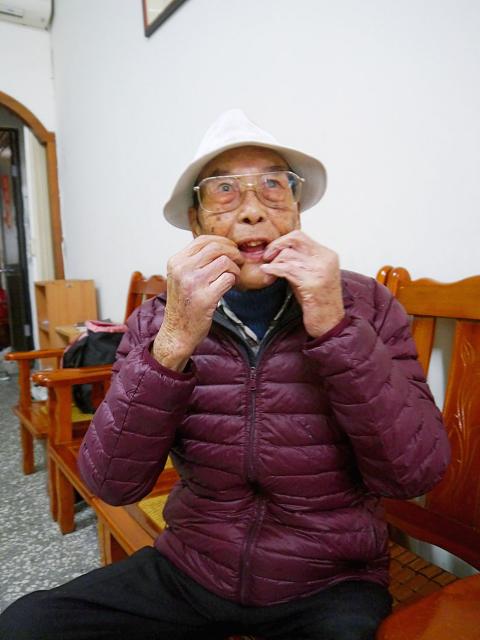Hsieh I-cheng (謝一誠), a 228 Incident victim, said that a certificate he is to receive today to restore his reputation cannot erase the pain and torture he experienced during his imprisonment.
Hsieh, 93, grew up in Taichung’s Beitun District (北屯) and was drafted to the transport unit of the Japanese military in Taichung when he was 19, where he became familiar with Taichung’s arsenal, he said.
On Feb. 28, 1947, the then-Chinese Nationalist Party (KMT) government violently suppressed a nationwide uprising against it and a series of bloody purges against civilians ensued in subsequent months. The event marked the beginning of the White Terror era that saw tens of thousands of people arrested, imprisoned and executed.

Photo: Chang Hsuan-che, Taipei Times
Hsieh said when he heard the crackdown had spread, he transported firearms and ammunition left behind by the Japanese military in an ammunition depot in Taichung’s Dakeng (大坑) to the downtown area to assist the militia.
On March 16, 1947, Hsieh was charged with theft and sentenced to death.
He spent more than two years in a jail in a military camp in Taichung’s Gancheng Borough (干城), he said.
“Those two years were a living nightmare,” he said.
Hsieh said that he shared a cell with 47 people and that they slept in shifts.
They were given a bowl of rice and two dishes per day and did not have enough water to drink, Hsieh said, adding that to survive the men drank each other’s urine.
During the night they were beaten with gunstocks and iron burns, given electric shocks and had buckets of cold water poured over their heads and forced into their mouths with hoses, Hsieh said.
Several times he feared that his stomach would explode, he said.
Hsieh said he was only dragged back to the cell after losing consciousness.
After two years and eight months, Hsieh was transferred to Taichung Prison, where he took his first shower since his imprisonment, he said.
After three-and-a-half years, Hsieh’s sentence was reduced and he was released, he said.
As his national identification card was marked with the Chinese characters for “228” (二 二 八) in red, he was required to report to the police every month, he said, adding that he had trouble finding a job until a relative working at the Household Registration Office told him to destroy his old national identification card and request a new one.
Originally named Hsien Yan-shan (謝炎山), Hsieh said he changed his name in the hope of starting a new life.
Hsieh said the Incident had a huge effect on his life
He took pain medication for decades after the torture, which lead to side effects, he said.
When he passes Dakeng today, he often thinks of the ammunition depot, he said.
He chose the numbers “228” as the last three digits of his cellphone number to remind himself of what had happened, he said.
This overdue certificate means nothing, Hsieh said, adding that he did what he did during the Incident because he loved Taiwan.

NOT AN OPENING: Trump’s violation of international law does not affect China’s consideration in attacking Taiwan; Beijing lacks capability, not precedent, an official said Taiwanese officials see the US’ capture of the president of Venezuela as a powerful deterrent to Beijing’s aggression and a timely reminder of the US’ ability to defeat militaries equipped with Chinese-made weapons. The strikes that toppled Venezuelan President Nicolas Maduro signaled to authoritarian leaders, including Chinese President Xi Jinping (習近平), US President Donald Trump’s willingness to use military might for international affairs core to US interests, one senior official in Taipei’s security circle said. That reassured Taiwan, the person said. Taipei has also dismissed the idea that Trump’s apparent violation of international law could embolden Beijing, said the official, who was not

US President Donald Trump said "it’s up to" Chinese President Xi Jinping (習近平) what China does on Taiwan, but that he would be "very unhappy" with a change in the "status quo," the New York Times said in an interview published yesterday. Xi "considers it to be a part of China, and that’s up to him what he’s going to be doing," Trump told the newspaper on Wednesday. "But I’ve expressed to him that I would be very unhappy if he did that, and I don’t think he’ll do that," he added. "I hope he doesn’t do that." Trump made the comments in

A cold surge advisory was today issued for 18 cities and counties across Taiwan, with temperatures of below 10°C forecast during the day and into tonight, the Central Weather Administration (CWA) said. New Taipei City, Taipei, Taoyuan and Hsinchu, Miaoli and Yilan counties are expected to experience sustained temperatures of 10°C or lower, the CWA said. Temperatures are likely to temporarily drop below 10°C in most other areas, except Taitung, Pingtung, Penghu and Lienchiang (Matsu) counties, CWA data showed. The cold weather is being caused by a strong continental cold air mass, combined with radiative cooling, a process in which heat escapes from

Snow this morning fell on Alishan for the first time in seven years, as a strong continental cold air mass sent temperatures plunging across Taiwan, the Central Weather Administration (CWA) said. The Alishan weather station, located at an elevation of about 2,200m in central Taiwan, recorded snowfall from 8:55am to 9:15am, when the temperature dropped to about 1°C, the CWA said. With increased moisture and low temperatures in the high-altitude Alishan area, the conditions were favorable for snow, CWA forecaster Tsai Yi-chi (蔡伊其) said. The last time snow fell at the Alishan weather station was on Jan. 10, 2018, while graupel fell there